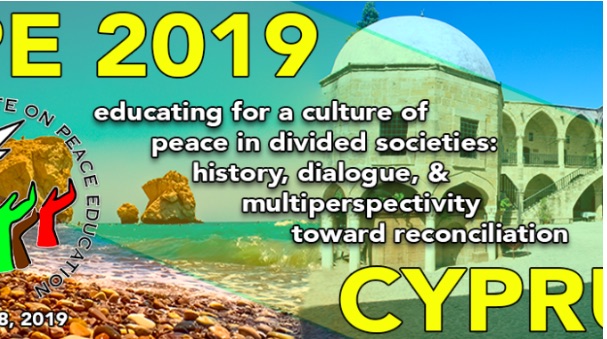EDUCATION FOR PEACE .
An announcement from the Global Campaign for Peace Education
The 2019 International Institute for Peace Education (IIPE) will be held in Nicosia, Cyprus at the Home for Cooperation (H4C) from July 21 to July 28, 2019. This year’s institute is organized in partnership with the IIPE Secretariat and the Association for Historical Dialogue and Research (AHDR).

IIPE 2019: Cyprus will convene educators from around the globe for a week-long, residential, learning community experience in peace education. A rich exchange of peacebuilding research, academic theory, best practices, and actions will be shared with participants from around the world through IIPE’s evolving dialogical, cooperative, and intersubjective modes of reflective inquiry and experiential learning.
Educating for a Culture of Peace in Divided Societies: History, Dialogue, and Multiperspectivity Toward Reconciliation
IIPE 2019 will focus on global issues of particular relevance to Cyprus and the adjoining region of the Mediterranean, North Africa, Southern Europe, and the Middle East – the intersection of Asia, Africa and Europe. This region is characterized on the one hand, by turmoil and tension, and on the other by the rich perpetual movements of people, ideas and experiences. While peoples’ past and present are presented in grey terms, their shared history(-ies) of coexistence, cooperation and exchange are often neglected in official discourses. In this context, recent developments with regards to war, terrorism, migration and refugeedom have led to the creation of monolithic narratives and rigid identities. These excluding narratives perpetuate violent conflicts and structural conditions that limit opportunities for sustainable peace and development. IIPE 2019 will emphasize the role of educators on all levels in addressing conflict in creative ways and offering alternatives to violence in contexts such as the Cypriot one. Educating for practical and theoretical methods is of paramount importance for the creation of inclusive identities and a critical hope for the region, and for humanity as a whole.
Being concerned with reconciliation and abetting conflict, we peace educators, theorists, researchers, students, and activists together face a serious challenge. On the one hand, dynamic transitions and tensions shape our present world: new movements of peoples are working for more dignity and inclusion, while at the same time forces of power are consolidating in ways that challenge how local, regional and global citizens can contribute to this vibrant transition in nonviolent, humanizing and ecologically viable ways. IIPE 2019 Cyprus’s inquiry is centered on how might we collectively frame the challenges we face in our diverse, particular, and shared spheres? How can a relational paradigm for peace help us theorize these challenges for more dignity, inclusion, and coordination? As we engage in deep listening and critical and reflective dialogue, what new understandings will we reach? What creative practices will emerge? In examining crossover issues, we aim to bring our best selves in relation to each other so that we might meld together our best theoretical, educational, and activist practices.
(Continued in right column)
Where is peace education taking place?
(Continued from left column)
Peace education and its intersections with history, political theory, conflict studies, reconciliation, the philosophy of peace, justice, and democracy in challenging times are among the areas of inquiry that will be most relevant at IIPE 2019. Applicants are invited to offer contributions on these and other thematic areas including, but not limited to:
* Identities (and anti-racist education) in divided and/or multi-faith, multi-ethnic and culturally and linguistically diverse societies
* Memory and remembrance (collective memory, communal memory, family history and memory, memory transmitted through celebrations, museums, monuments, oral history, understanding of heritage…)
* National celebrations (memory transmitted through ceremonies, anniversaries, memorials, commemorations and celebrations)
* The philosophical basis for reconciliation and peace
* Dialogue for reconciliation
* History teaching and historical dialogue as means for peacebuilding: the role of history education in conflict or post-conflict communities; peace and reconciliation; teaching history in divided societies; history education and values, beliefs and human rights
* Gender and peacebuilding in divided societies; gender and history
* Civil society, global citizenship, and local participation
* Youth and entrepreneurship
* Public space and deliberation; the city as an educating agent
Experiencing Cyprus
Cyprus, the island of Aphrodite, the goddess of love and beauty, has been separated for over 50 years, and, apart from a divided capital, barricades, barbwires and checkpoints, it offers numerous opportunities for exploring ancient and recent civilizations and experiencing, first hand, manifestations of the willingness to defeat time and space barriers and create spaces for creativity, imagination and sharing. The ‘wondering peace educator’ will be offered the chance to explore issues of memory and remembrance, conflicting narratives and identity and public history, while, at the same time, he/she will engage in the exchange of ideas and examples on breakthrough initiatives that have the potential to turn the island into a hub of innovation in the fields of History for Reconciliation and Education for a Culture of Peace.
In particular, all participants will have the opportunity to experience the contextual conditions existing in Cyprus regarding the conflict and become acquainted with local breakthrough initiatives on history as a means for reconciliation and education for a culture of peace. This will be enhanced through an Open Public Day, excursion(s), and unique cultural experiences in Cyprus. IIPE 2019 will also facilitate an exchange with Cypriot educators, from all communities, via the Open Public Day, which will feature immersion and exchange opportunities exploring global obstacles and possibilities for peacebuilding through education in other contexts.